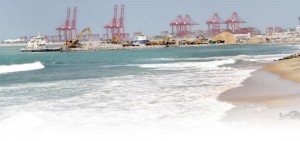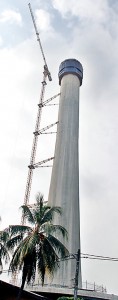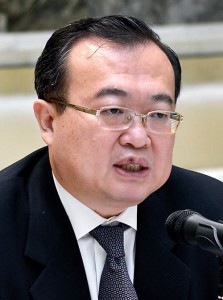News
China’s Liu: It’s up to Sri Lanka’s Govt. to expose deals
For the first time since it became Sri Lanka’s key infrastructure supplier, the Chinese Government had a shot at transparency this week — and whacked the ball firmly into Colombo’s court.

Colombo Port Cit: One of China's largest investments in Sri Lanka. Pix by Indika Handuwala
It was the Sri Lanka Government’s responsibility to be “reachable, accessible” and to provide information to media, to parliament and to the people regarding Chinese projects, said Liu Jianchao, Assistant Minister of Foreign Affairs.
“Bear in mind that, for most of the projects, China and the Chinese companies are just the contractors,” he said, during a briefing at the Chinese Embassy in Colombo on Friday. “Contractors should work with the Government.” As policies were shaped by the Sri Lankan Government, “they have to do the explanations”.
Mr. Liu was in Colombo from February 5-7 as a Special Envoy of the Chinese Government. He last visited Sri Lanka in September 2014, when a fresh splurge of Chinese-funded projects was initiated during President Xi Jinping’s official visit.
Despite years of speculation regarding these initiatives (fuelled by a lack of information or accountability) it was the first time that Chinese officials hosted such a media briefing in Colombo. The meeting was attended by a limited number of local media and handpicked academics and

Lotus Tower
researchers. It lasted nearly one-and-half hours and all questions were taken.
The envoy made some telling comments about good governance, corruption and the investment climate in Sri Lanka. Asked when more private sector capital — not loans — will flow into Sri Lanka, he said it was for Chinese companies to determine. They needed to know that the returns on investment would be reasonable. Their decision would also depend on Sri Lanka’s legal framework, investment environment, labour cost and many other factors.
“So they have to do very serious study,” Mr. Liu explained. The Chinese Government will encourage companies to do this study. But he added: “For the improvement of the environment for investment, what is important? Good governance is very important. Chinese companies would be very much willing to work in an environment that is corruption free.”
Any investor will also check whether there was sufficient infrastructure, such as water and power supply. “If they believe that their rights and their investment will not be properly protected by the laws, they’ll not invest,” the envoy stressed. “So we have a long way to go to have a larger scale of investment from China.”
While Chinese lending has ballooned since the end of the war in 2009, investment has been glaringly sluggish. Mr. Liu’s remarks were significant in view of the new Government’s yo-yoing stance on one of China’s largest investment to date-the Colombo Port City.
The controversial agreement was signed during the presidency of Mahinda Rajapaksa but roundly criticised by the Opposition United National Party which is now in power. Mr. Liu said Sri Lankan officials had told him that the project was still being re-evaluated and assessed. The report was not ready so they could not give him specific comments. However, China will stay in touch on all projects and work with Sri Lanka to settle the issues in a friendly manner, he vowed.
“As for speculation that have been going on relating to major projects between the two countries, both sides expressed a willingness to find a proper solution to the outstanding questions,” Mr. Liu said. “We have been very frank and also very responsible towards each other’s concerns.”
China respected the policies of Sri Lanka’s new Government with regard to the re-evaluation of all projects — not only China’s but those conducted by other partners of Sri Lanka. China hoped all of them will proceed in a strong manner. But if the re-evaluation threw up any problems, the two sides will find settlement without affecting their strong bilateral relations.
Details were decidedly sparse in key areas. While Mr. Liu referred several times to an ongoing re-evaluation of Chinese projects by the Sri Lanka, he would not reveal the areas of concern. If costs were the problem, he said, “The Chinese companies can work with the (Sri Lankan) Government in explaining why the costs are like this.”

Liu Jianchao, Special Envoy of the Chinese Government. Pic by Anuradha Bandara
“We will like that all these projects be transparent and open and understood by the people of Sri Lanka, by parliament, by the media,” Mr. Liu reiterated. “But we leave it with the Sri Lankan Government to do so. Because Chinese companies are open. We have nothing to hide.”
Mr. Liu also could not say how many agreements Beijing had signed with Colombo. He laughed before replying: “A dozen of them, I don’t know. There are too many of them.”
There will be speculation, questions and arguments about any project in any country, including in China, the envoy said. However, the agreements between Sri Lanka and China over the past several years were drafted through “very serious, very pragmatic and very businesslike procedures”. The laws, terms, conditions and regulations set out by the Sri Lankan Government were respected.
The reason for his presence in Sri Lanka, Mr. Liu added, was “because the speculations have been going on and because we care about the relationship so much.” He also met executives of Chinese companies during his visit.
The envoy made pointed comments on regional security. The China-Sri Lanka relationship is “not targeted against any party”.
“China sees the world, and China is dealing with the world, not on a zero-sum basis,” he said. “We seek common prosperity. We seek peace for all. We seek cooperative security and comprehensive security. So our relations with any country are not targeted on any other country.”
China was working with other countries in the region, including Sri Lanka, India and Pakistan, to strengthen infrastructure. “In China, we have the saying that if you want to get rich, you have to build the road first and if you want your economy to take off you have to build the runway first,” he smiled. “So this is why China is so determined to work with our partners in developing the infrastructure of all these countries.”
The docking of a Chinese submarine in Colombo port last year should not be taken too seriously, Mr. Liu emphasised. It had been escorting trading vessels along the shipping lane to ward off pirates. “It is for sure that China is playing a more significant and important role in the security arena in the future,” he continued. “And China has been asked to shoulder more responsibilities in making sure that the regions in the world are safe.”
“This is one of the measures so don’t take that too seriously,” he said. “This is not against any country. We are not using Sri Lanka against another country.”
Mr. Liu was asked how the new Sri Lankan Government compared with the last regime. Amidst laughter, he replied, “We don’t compare”.
“We work with both of them,” quipped Chinese Ambassador Wu Jianghao, from his side.

